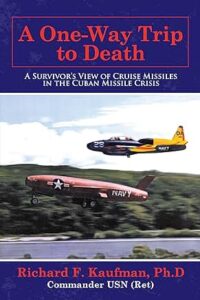Title: A One-Way Trip to Death: A Survivor’s View of Cruise Missiles in the Cuban Missile Crisis
Author: Richard F. Kaufman, Ph.D
Publisher: Archway Publishing
ISBN: 978-6657-0245-4
Pages: 121
Genre: Memoir
Review by: Barbara Bamberger Scott
Hollywood Book Reviews
Author Richard F. Kaufman, PhD, now retired from the US Navy, recalls in vivid personal and professional detail his experience and observations while piloting cruise missiles, poised in 1962 to sacrifice his life as part of America’s response to Russian aggression.
In the wake of World War II and the rigors of the Cold War, the US military tasked itself to develop missiles capable of carrying and deploying large nuclear bombs. Kaufman was an observer and participant in these complex technological advances. The irony of this critical aspect of the weapons race was that such planes would require that, as the author states, “pilots were inherently expendable…” Kaufman amply arrays a technical and pragmatic view of the composition of these remarkable machines and establishes his personal attachment to the subject as one of a group selected to deploy Regulus missiles in the few grim days of 1962 known as the Cuban Missile Crisis. Had the tension escalated beyond those momentous 12 days, Kaufman would likely not have lived to write, as he has, this lucid tale of warfare told from the viewpoint of those who carry it out. Even if he and his fellow flyers were to somehow live through the missile’s weapon deployment, they would then have had to brave ”the frigid waters of the Kamchatka Peninsula,” a possibility for which they had been trained but which offered only a narrow chance for survival. Kaufman was naturally beset by thoughts of his wife and children, safe, perhaps, but whom he might never see again. He and his fellow missile pilots banded together in solemn lockdown awaiting their orders, their spirits briefly lifted by the seemingly last-minute visit of a Catholic priest. This portion of the book’s complex tapestry will open readers’ minds to the bravery and patriotic sense of duty that military service requires, evoking a clear picture of the book’s ominous title. When the international crisis was narrowly averted, the airmen’s mission was suddenly called off – perhaps, as Kaufman suggests, through “the prayers of the good Father or the good judgment of President Kennedy and Nikita Khrushchev.”
In addition to the intricately drawn portrait of missile design and purpose, the author paints a poignant portrait of Japan’s kamikaze crews, one of whom he met and escorted as part of his US Naval duties during his service in Yokosuka, Japan. Kozo Kagawa came there to recount his military experience mere days before the end of World War II, when he believed he would soon commit physical suicide but attain, he was told, spiritual rewards in Shinto heaven. These eerie recollections, shared with Kaufman who befriended him, comprise a repeated theme in this dynamic memoir.
Kaufman’s stirring narrative concludes with an exploration of further missile development, after the Cuban Crisis and doubtless stirred by that potential cataclysm. One such advance was the Tomahawk aircraft that requires no human piloting. The Tomahawk’s potential became reality during the Gulf War, when, Kaufman reports, “not one that got through missed its target.” The work includes photographs and technical detail, and puts the perspective of those who design, test and pilot military equipment into realistic focus. A One-Way Trip to Death, laden with sound and profound realities of warfare, will attract those who have soldiered or contemplate doing so, along with their families and fellow patriots.

